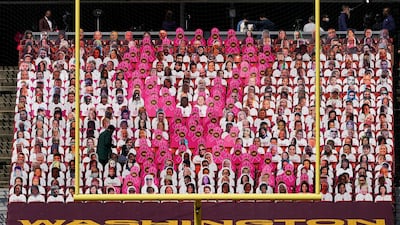The month of October is dedicated to breast cancer awareness, and campaigns to inform people about importance of early detection, treatment and impact on patients are launched every year. With Covid-19 on the rise and concerns about public health being driven by the pandemic, this cause is not receiving the attention it deserves, although women continue to suffer from breast cancer every day.
In 2018, 2 million people were diagnosed with breast cancer, the most commonly occurring cancer in women. While an overwhelming majority of patients are women, the disease afflicts men, too. Men account for fewer than one per cent of cases.
The cause of breast cancer remains unknown, but medical professionals understand that certain people are at greater risk of contracting it than others. A family history of breast cancer, menstruation before the age of 12, late menopause after the age of 55 and other genetic factors all can increase one’s susceptibility.
Lumps or unusual secretions are among the most common symptoms. But many breast cancer patients are asymptomatic, meaning yearly screenings and check-ups are necessary to spot it early.
Early detection is especially important with breast cancer because, unlike some other forms of cancer, patients have a survival rate of 99 per cent if the cancer is discovered in its early stages, according to the American Cancer Society. That figure drops to just 27 per cent if it is treated only after it has spread to other organs.
The American Cancer Society recommends that women over the age of 40 who are at moderate risk of contracting the disease get annual mammograms. People who are at high risk should get breast MRIs and mammograms annually after the age of 30.
According to the US-based National Breast Cancer Foundation, one in eight women will be diagnosed with breast cancer at some point in her lifetime. Yet some women refrain from seeking medical attention, some due to fear, others due to lack of awareness and some due to social stigma. The UAE has launched several awareness campaigns to encourage women to seek help early on, such as the Pink Caravan, an NGO that operates mobile mammography units throughout the country.
In addition to raising awareness and combatting disinformation about the disease, it is crucial that the voices of survivors are heard. Public figures and breast cancer survivors who speak up about their experiences can help break the stigma. For example, Lebanese pop star Elissa has discussed her battle with breast cancer on social media, encouraging other women to speak up and others get tested.
Covid-19 has added further challenges, as medical funding has, in many instances, either been cut or diverted to coronavirus research, and patients seeking treatment abroad now face travel restrictions. Tawam Hospital, home to Abu Dhabi's main publicly run oncology department, has had to expand its capabilities as it faced a 20 per cent increase in patients since the onset of the pandemic.
We all have a part to play in the fight against breast cancer, whether it is by spreading awareness, supporting survivors, or encouraging loved ones at risk to undergo yearly examinations.


